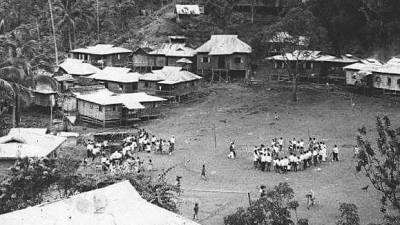KG RATAU could have remained just another remote Dusun village in Ranau, where villagers endured a 36km trek through forests and mountains to reach town.
But in the late 1940s or early 1950s, Kg Ratau achieved what many neighbouring villages did not; it became a hub for formal education and the spread of Islam.
Kg Ratau and SK Ratau played a vital role in opening the door to formal education for the Dusun community in Ranau, nurturing generations of leaders and producing notable national figures with roots in the district.
The secluded village also became an example for others by prioritising education while also serving as a centre for Islamic propagation among the Dusun people.
According to records, SK Ratau – formerly known as Government Primary School Ratau – was established in 1948 as a modest wooden structure with limited facilities.
SK Ratau used to be in Tontolob, near Kg Terolobou, but was later moved to Kg Ratau for a more central and convenient location for students from surrounding villages. Amir Jahali was the first headmaster in Tontolob.
While the primary school served children from Kg Ratau, Sosondoton and Terolobou, it also attracted students from neighbouring villages such as Kg Piasau, Tudan, Toboh, Kemburongoh and Karanaan, as it was the only school within reach.
Prominent figures who began their education at SK Ratau include former federal minister Tan Sri Kasitah Gaddam, current Sabah State Finance Minister Datuk Seri Masidi Manjun and former Sabah state education director Datuk Muhiddin Yussin.
Kasitah attended SK Ratau from 1956 to 1959, later becoming the school’s first graduate.
Masidi completed his primary education in just three and a half-years, from 1958 to 1961.
“I started school at SK Ratau at the age of eight. At that time, textbooks or reference materials were practically non-existent,” recalled Masidi, who was born at Kg Terolobou.
According to Datuk Nordin Siman, former mayor of Kota Kinabalu City, his late father, Siman Yaakub – who once taught at SK Ratau – often said Masidi was a gifted student who advanced quickly through his studies.
Masidi went on to obtain a Bachelor of Laws degree from University of London in 1977, and in 1979 was called to the Bar at Lincoln’s Inn, London.
Those who know him say that Masidi has always emphasised the importance of education in rural development.
Nordin also recalled that his late father began teaching at SK Ratau in Jan 1, 1958.
Siman Yaakub was appointed SK Ratau headmaster on April 4, 1960 and later became headmaster at SK Ranau on Jan 11, 1963.
Muhiddin, who served as Sabah state education director from January 2010 to Dec 31, 2012, studied at SK Ratau from 1962 to 1966.
“I remember that SK Ratau being regarded as the best primary school
in the Ranau district, not only academically but also in sports, especially volleyball,” he said.
Among the most respected figures in the history of Islam among the Dusun community of Kg Ratau was Mohd Ali Kandalis, a native Dusun.
He converted to Islam in 1943 through Raden Mohamad Syarif Ambek or Mandur Syarif at the Lobou estate in Tuaran. Several other villagers from Kg Ratau followed his example.
Mohd Ali became a central figure in spreading Islam and sharing knowledge of traditional healings among the Dusun villagers in Kg Ratau, including surrounding areas like Sosondoton, Togudon and Karanaan.
The Dusun (now termed as Kadazan-Dusun), one of the largest indigenous groups in Sabah, are widely known for their rich cultural traditions, ancestral belief and historical connection to the land.
Yet, what is less recognised is the presence of a significant number or Dusun who practice Islam as their faith. Their journey towards Islam is a story deeply rooted in migration, education and community leadership, beginning with Raden.
Historical accounts suggest that this Javanese figure, often referred to by local leaders, played pioneering role in introducing Islam to the Dusun of Ranau.
Through his teachings, a dedicated student, Mohd Ali Kandalis, emerged as key propagator of the faith.
Mohd Ali was instrumental in spreading Islamic teaching among his community during a time of cultural transition.
As Islam took root in Ranau, migration patterns shaped the growth of faith.
Many Dusun Muslim began moving beyond their traditional homeland, establishing new settlements in Keningau, Sook and Tamparuli and other parts of Sabah.
Over time, some families even extended their presence to other regions of Malaysia, carrying with them the legacy of faith introduced through this unique historical pathway.
Today, it is not uncommon to encounter Dusun Muslims across Sabah who trace their religious heritage back to this early chapter of conversion.
The story serves as a reminder of the community’s ability to embrace new belief while preserving their cultural identity.
This heritage remains a living testimony to Sabah’s cultural diversity – a narrative of faith, migration and the continuing bond between tradition and spiritual growth.
Emin Madi
